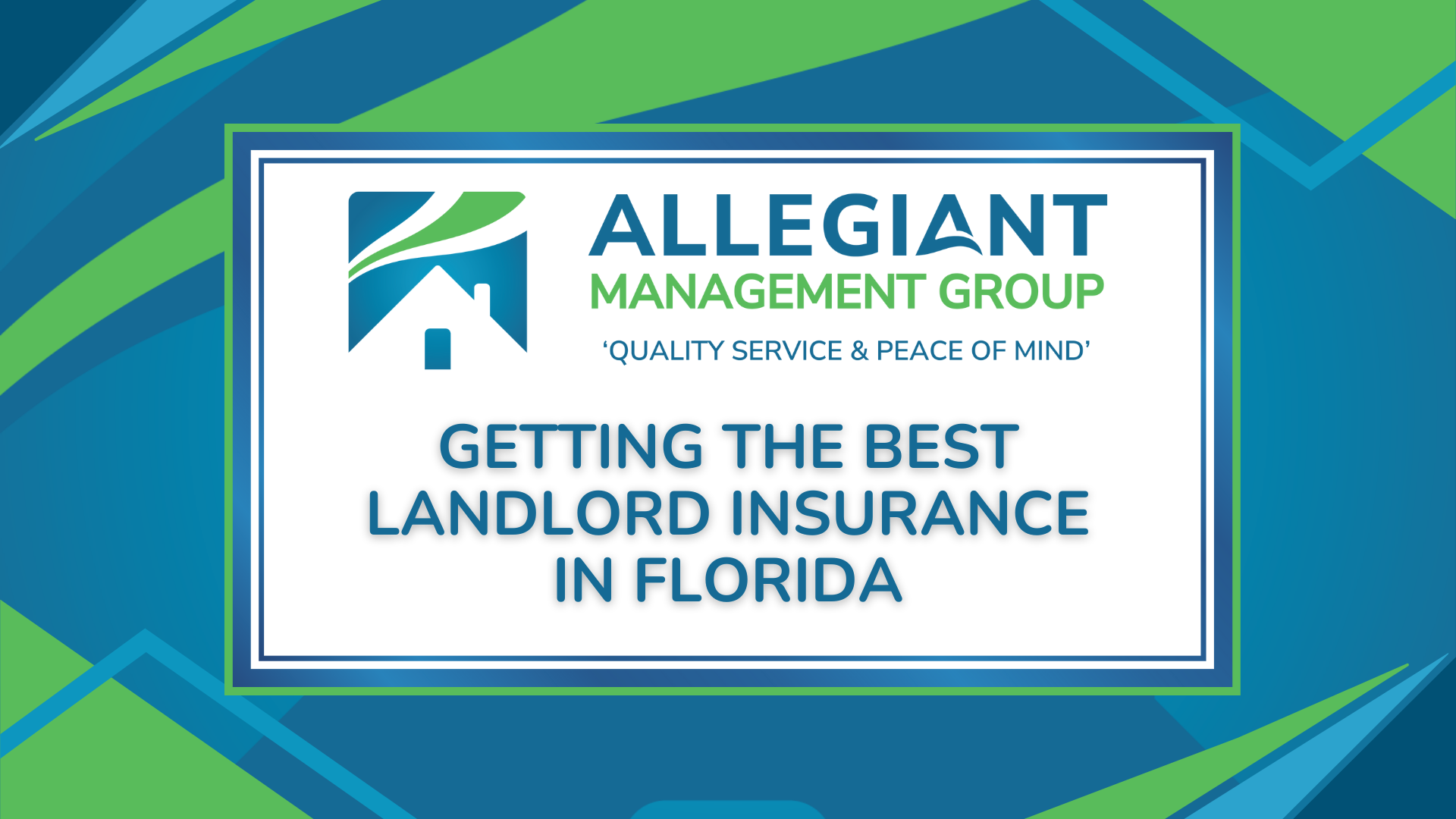Getting the Best Landlord Insurance Coverage in Florida
Owning a rental property in Florida can be a profitable endeavor, but it also comes with unique challenges.
That’s why having the proper property coverage is essential for protecting your investment as a property owner.
Rental Property Insurance provides financial protection against property damage, liability claims, and loss of rental income. The cost of landlord insurance coverage varies by coverage and carrier.
It’s important to know how to compare each and select the policy that offers the best protection for your rental properties and property coverage.
This guide will explain everything you need to know about Florida landlord insurance, assisting you in choosing the right coverage for your rental properties, including any optional coverages.
Landlord insurance companies should offer great customer service and provide adequate coverage for your needs.

Understanding Landlord Insurance in Florida
Landlord insurance is a type of property insurance specifically designed for rental properties.
It protects landlords against various risks, such as property damage, liability claims, and loss of rental income if the property becomes uninhabitable.
There is a wide range of options out there, and landlord insurance typically includes coverage for a broad spectrum of risks.
Florida landlords face unique risks, including hurricanes, flooding, and high humidity. As a result, Florida property insurance often requires additional coverage to address these specific threats.
It has been said that there is a property insurance crisis in Florida, affecting all policies, not just landlords.
Why Landlord Insurance is Essential for Florida Properties
Florida’s climate can be unpredictable, with hurricanes and flooding posing major risks for rental properties.
Without adequate coverage, property owners could face significant financial losses. Hurricane coverage is more complex than normal.
Having landlord insurance in Florida ensures that you’re financially protected from these risks.
It covers damages caused by natural disasters and helps landlords recover lost rental income if their property becomes uninhabitable.
Expanding Your Coverage with Optional Add-Ons
While a basic landlord insurance policy covers many common risks, Florida landlords often need additional coverage to fully protect their properties.
Here are a few common optional coverages you should consider:
- Flood Insurance: Florida is prone to hurricanes and floods, which are often not covered by standard policies. Flood insurance is a must-have for landlords in flood zones.
- Windstorm Insurance: This type of insurance covers damages from high winds and hurricanes. Windstorm insurance is crucial if your property is in an area vulnerable to hurricanes, like coastal Florida.
- Vandalism Coverage: If your rental property is vacant for long periods, you might want vandalism protection to cover damages caused by vandalism.
- Umbrella Insurance: This is an extra layer of liability protection in case a lawsuit exceeds the limits of your regular liability insurance.
Adding these coverages to your basic policy ensures comprehensive protection, especially given Florida's unpredictable weather and environmental risks.
How to Compare Landlord Insurance Quotes in Florida
Comparing quotes for landlord insurance can help you find the best coverage at the most affordable rates.
Here are some tips to ensure you get the most accurate quotes:
- Provide detailed information about your property, including age, size, and safety features.
- Check whether the quote includes coverage for natural disasters, like hurricanes or floods, especially if your property is located in a high-risk area.
- Check the amount of landlord liability insurance included in the policies.
- Look for insurers with experience in the Florida market who understand the specific risks associated with rental properties in the state.

Using Local Insurance Agents to Your Advantage
Working with a local insurance agent can make a big difference when selecting your landlord insurance.
Local agents are familiar with Florida’s market and the environmental challenges landlords face, making them well-positioned to recommend coverage that fits your needs.
Additionally, they can help you navigate the claims process, ensure that all your necessary coverages are included, and provide guidance on minimizing your insurance premiums.
Local agents often have established relationships with insurance providers and may be able to secure better deals than if you were searching for insurance on your own.
Filing a Landlord Insurance Claim in Florida
Understanding how to file a claim efficiently can save you time and reduce stress.
In Florida, the risks of hurricanes, flooding, or tenant damages are real, so you’ll want to be prepared to file a claim quickly after an incident.
- Document the damage: Take detailed photos and videos of the property damage and gather any witness statements, if applicable.
- File promptly: Most policies require you to file a claim within a certain period after the damage occurs. Don’t delay, as this could affect the outcome of your claim.
- Work with an adjuster: After filing a claim, the insurance company will send an adjuster to assess the damage. Be prepared to provide all documentation and cooperate fully with the adjuster to ensure a fair assessment. Make sure to include loss of rent and any damages to personal property.
- Follow-up: Claims can sometimes take time to process, so make sure to follow up with your insurance provider to check on the progress and ensure all your paperwork is in order.

Preventative Maintenance to Lower Insurance Premiums
Performing regular maintenance on your property not only keeps your tenants happy but can also lower your insurance premiums.
Here are some steps you can take to keep your property safe and reduce your insurance costs:
- Inspect regularly: Conduct regular inspections to identify potential hazards before they become costly problems, like water leaks or structural damage.
- Install security features: Adding security systems, smoke detectors, and fire extinguishers can help reduce the risk of damage and lower your premiums.
- Upgrade windows and doors: Reinforcing windows and doors with hurricane-proof materials can protect your property from storm damage, which is particularly important in Florida.
Conclusion: Protecting Your Investment with the Right Coverage
Securing the best landlord insurance in Florida is an essential part of protecting your rental properties.
It’s more than just a cost—it’s an investment in the future of your property.
By comparing each of the quotes and selecting a reliable provider, you’ll ensure that your rental business is protected from Florida’s unique risks. This will help during hurricane recovery.
Ready to protect your rental property? At Allegiant Management Group, we understand the unique risks Florida landlords face and can help you navigate through the complexities of landlord insurance.
Let us connect you with our trusted insurance agents to get you the best insurance coverage in Florida that fits your needs. Contact us today

Frequently Asked Questions (FAQs): The Best Landlord Insurance Coverage in FL
What does landlord insurance cover in Florida?
Landlord insurance in Florida covers property damage, liability protection, and loss of rental income. It protects against hurricanes, fire, vandalism, and tenant-related damages. Liability coverage includes legal and medical expenses if someone is injured on the property. Loss of rental income applies if the property becomes uninhabitable due to covered events.
Do I need flood insurance for my rental property in Florida?
Yes, flood insurance is necessary for rental properties in Florida, especially in FEMA-designated flood zones. Standard landlord insurance does not cover flood damage. Policies through the National Flood Insurance Program (NFIP) or private insurers protect against water damage from hurricanes, storm surges, and heavy rain.
How can I reduce my landlord insurance premiums in Florida?
Reduce landlord insurance premiums in Florida by installing security systems, wind mitigation features, and fire alarms. Increase your deductible, bundle policies, and maintain good tenant screening practices. Choosing a higher windstorm deductible and reinforcing the roof can also lower costs. Compare quotes from multiple insurers for the best rates.
What is the best landlord insurance Florida has to offer?
The best landlord insurance in Florida depends on coverage needs and budget. Top providers include State Farm, Progressive, Allstate, and Citizens Property Insurance for high-risk areas. Look for policies covering hurricanes, liability, and loss of rental income. Comparing quotes ensures the best protection at competitive rates.
How does landlord insurance differ from homeowners insurance?
Landlord insurance covers rental property damage, liability, and lost rental income, while homeowners insurance protects owner-occupied homes. Landlord policies exclude tenant belongings but include liability for tenant injuries. Homeowners insurance covers personal property and additional living expenses, which landlord insurance does not.
What should I do if a hurricane damages my rental property?
After a hurricane damages your rental property, document the damage with photos, contact your insurance provider, and file a claim. Secure the property to prevent further damage and communicate with tenants about safety and repairs. Hire licensed contractors for repairs and comply with local building codes.
Can I require my tenants to have renters’ insurance?
Yes, Florida landlords can require tenants to have renters’ insurance by including it in the lease agreement. Renters’ insurance protects tenants’ belongings and provides liability coverage. It also reduces landlord liability for tenant property damage or injuries. Always specify coverage requirements in the lease for clarity.
Disclaimer: The information provided is for general informational purposes only and is not legal advice or the selling of insurance. For legal advice, please consult a qualified attorney. For insurance, please contact a licensed insurance agent.
Blog Updated: 03/09/2025



